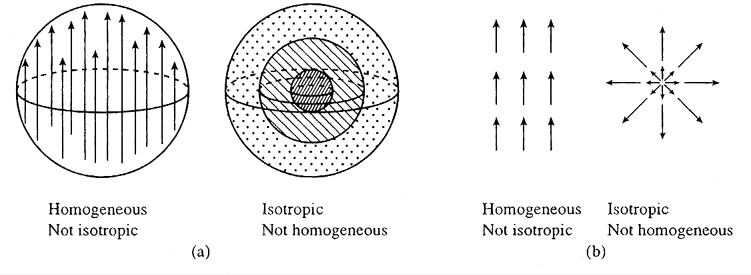
isotropic [ahy-suh-trop-ik, -troh-pik] ExamplesWord Origin adjective
- Physics. of equal physical properties along all axes.Compare anisotropic(def 1).
- Zoology. lacking axes that are predetermined, as in some eggs.
Also i·sot·ro·pous [ahy-so-truh-puh s] /aɪˈsɒ trə pəs/. Origin of isotropic First recorded in 1860–65; iso- + -tropic Related formsi·sot·ro·py, nounnon·i·so·trop·ic, adjectivenon·i·sot·ro·pous, adjectiveun·i·so·trop·ic, adjectiveun·i·sot·ro·pous, adjective Examples from the Web for isotropic Historical Examples of isotropic
Both are adapted for determining the axes of elasticity and for the differentiation of isotropic and anisotropic bodies.
Microscopes and Accessory Apparatus
Ernst Leitz
Sometimes the phrases “isotropic tension” and “hydrostatic pressure” are used instead of “uniform” tension or pressure.
Encyclopaedia Britannica, 11th Edition, Volume 9, Slice 2
Various
The relations between stress and strain in a material which is not isotropic are much more complicated.
Encyclopaedia Britannica, 11th Edition, Volume 9, Slice 2
Various
For many years the luminiferous medium was identified with the isotropic solid of the theory of elasticity.
Encyclopaedia Britannica, 11th Edition, Volume 9, Slice 2
Various
This is the “principle of least time” first formulated by Pierre de Fermat for the case of two isotropic substances.
Encyclopaedia Britannica, 11th Edition, Volume 16, Slice 5
Various
British Dictionary definitions for isotropic isotropic isotropous (aɪˈsɒtrəpəs) adjective
- having uniform physical properties in all directions
- biology not having predetermined axesisotropic eggs
Derived Formsisotropically, adverbisotropy, noun Word Origin and History for isotropic adj.
1864, from iso- + Greek tropikos “belonging to a turning,” from tropos “a turning, way, manner” (see trope).
isotropic in Medicine isotropic [ī′sə-trŏp′ĭk, -trō′pĭk] adj.
- Identical in all directions.
Related formsi•sot′ro•py (ī-sŏt′rə-pē) null n. isotropic in Science isotropic [ī′sə-trō′pĭk, -trŏp′ĭk]
- Identical in all directions; invariant with respect to direction. For example, isotropic scattering of light by a substance entails that the intensity of light radiated is the same in all directions. Compare anisotropic.
 Liberal Dictionary English Dictionary
Liberal Dictionary English Dictionary